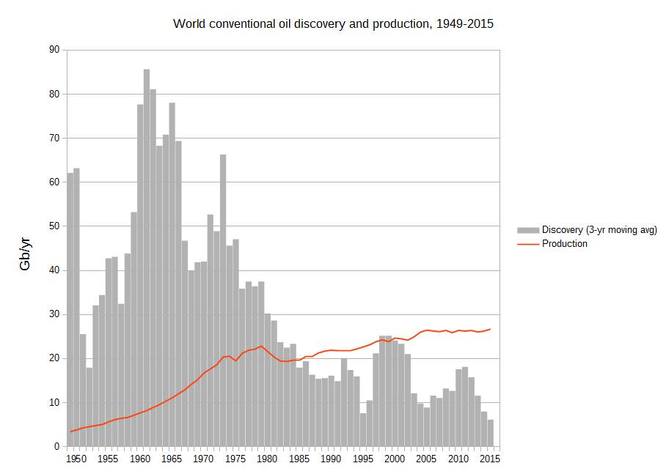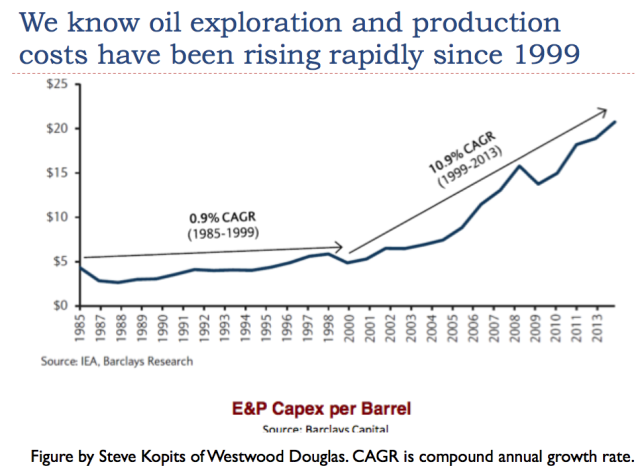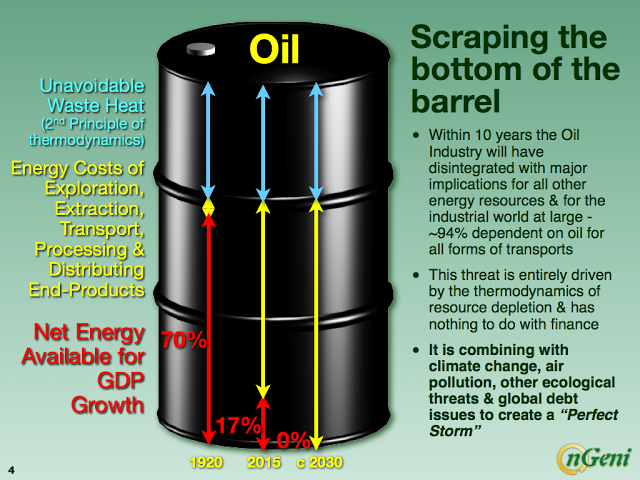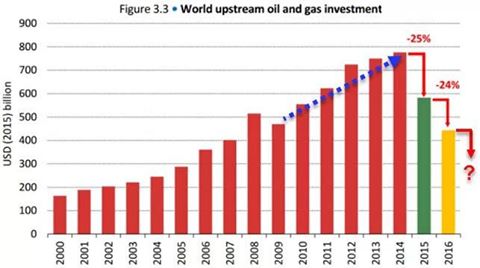|
Most people aren't paying attention. Most people have no idea what's going on. Industrial civilization is already having serious health problems and heart palpitations. By 2020, industrial civilization is going to suffer a massive stroke. By 2025, it will be in hospice. By 2030, it will be dead. Which catchy phrase best captures the pot of boiling water we find ourselves in? Time is running out. We are at the tipping point. The dominos are falling. Whichever one we use, one thing is clear: a fundamental shift in fossil fuel use is underway. Phase 1 was the peak of conventional oil in 2005, with the ensuing GFC (global financial crisis) in 2008, papered over by massive debt conjured out of thin air by the financial manipulator magicians at the Federal Reserve. Phase 2 starts with the growing ineffectiveness of these financial measures against stark net energy realities. Let me set the stage, and reiterate the premise for those who haven't read other posts of mine. There is a great deal of difference between conventional and unconventional sources of oil. The former was cheap and relatively easy to extract, the latter is much more difficult and costly. Underlying this though is the EROEI (energy return on energy invested). If you kept giving someone a dollar and continually got back 100, you'd be making money so fast your head would spin. Imagine if you then used this money to invest in a lavish lifestyle with multiple houses, a garage full of amazing cars, a fleet of super-yachts, and staffed hundreds of people full time to take care of all your properties and cater to your every whim. Then imagine that as time went on you got back less and less money for every dollar you gave. Eventually you wouldn't be able to afford all those lavish things. You'd have to cut back. You could, perhaps, once things got seriously tight, go into debt to keep up your lifestyle, but you'd have to go into the red on the ledger books in order to do so. And this could not continue indefinitely so long as you continued to receive less and less money back for every dollar you gave. This is precisely the situation we as a civilization have come to. We built industrial civilization on high EROEI ratios. Numbers generated from multiple studies give estimates of 100:1 returns at the beginning. Today we are down to a total global ratio for all liquids at about a 14:1 return rate. Which is interesting because this is actually the ratio that Charles Hall, one of the founders of the EROEI methodology, concludes is about the minimum needed to prevent collapse. And the ratio numbers inexorably decline no matter what we do. After the peak of conventional oil in 2005, we were given breathing room from a total production peak through unconventional sources of oil such as tar sands, shale, fracking, and deep offshore wells. But these sources are far more energy-intensive to procure as well as prohibitively expensive; the only way companies were able to extract from them was by going into massive debt. The unconventional oil that we have gone so in debt to acquire notoriously provides a small fraction of the net energy we've come to expect from conventional oil sources. "The problem of eroding energy profitability is hard to deal with partly because the decline is happening so fast... Oil no longer provides as much of a stimulus to the economy, which just can’t grow as it did before, and this in turn sets in motion a self-reinforcing feedback loop of stagnating or falling labor productivity, falling wages, falling consumption, reduced ability to re-pay debt, failure to invest in future energy productivity, falling energy supplies, falling tax revenues, and so on. How long can debt continue to substitute for energy before the next traumatic phase of this feedback process begins in earnest?" - Richard Heinberg [Source] So now we come to the core of the issue. The industry is plagued by two main things: discoveries and future investments. Both are by-products of the two things already mentioned: we are out of the cheap, easy to extract oil, and what is left has an ever-lower net energy return. We've been building civilization on the huge discoveries between 1950 and 1980 or so depicted on this graph. Clearly production cannot continue apace for much longer. Notice that the trendline starts really going up at about the year 2005. This graphic shows how, as energy costs of exploration, extraction, transport, processing, and distributing rise, the net energy left over for economic growth decreases. In this chart we can see that after the global financial crisis in '08 there was a historic amount of spending towards more and more oil production. All of which was debt-based, as I showed in this article. But as we saw with the earlier graph, there has not been a commensurate amount of discoveries. We've spent all that money to dig out horribly low net energy unconventional oil because we are not discovering any better sources. This is clearly ending. Companies are realizing that they cannot profit from it, and are no longer investing in it - most are going bankrupt, some are treading water. Conclusion: All of this adds up to one thing: we're about to head into a new era. The thermodynamic collapse is hastening a day of reckoning, way sooner than most people think. But don't just take my word for it. The CEO of Saudi Aramco, Amin Nasser, was recently (July, 2017) quoted at the World Petroleum Congress in Istanbul as saying that the world is heading towards an oil supply shortage before too long as a result of falling discoveries of new conventional oil reserves and steep drops in new investment. At that same conference, Mark Richard, who is the senior vice president for global business development at Halliburton, said that the industry's slashing of about $2 trillion in investments will weigh heavily on the market in a few years when oil supplies fail to keep up with demand and will lead to massive oil price shocks when the market catches up - according to him, somewhere around 2020-2021. Remember, in 2008, oil prices spiked to $147 a barrel; then we had the global financial crisis. This is the "massive stroke" I said industrial civilization will have by about 2020. Once this thing hits, things will start deteriorating much more quickly. The second phase of the thermodynamic collapse starts when the growing ineffectiveness of these financial measures against stark net energy realities hits a brick wall. Are you ready for phase 2?
11 Comments
Christopher Macy
7/20/2017 02:27:41 pm
https://youtu.be/aKWPht3fU-o
Reply
The only people who believe Elon Musk's futuristic cornucopianism will save business as usual are those who are lobotomized. None of his projects are profitable or sustainable. About $4.9 billion in subsidies props up his empire of debt-fueled lunacy. Without debt, and more importantly without oil, his fables will wash away along with everything else.
Reply
Allan
8/21/2017 02:08:37 am
Well this of course does not consider the exponential decrease in solar cell cost and increase in efficency and exponential production of renewable and take up of renewable electricity which will offset the need for as much oil or coal for that matter.
Reply
johnny
8/22/2017 09:57:42 am
Those who are convinced of peak oil from a decade back are no more interested in the ongoing technology revolution now, then they were then. Peak oil a decade back GAVE us EVs, otherwise known as "peak oil personal transport solutions" to those of us who no longer spend $$ on fuels for our cars. The wife topped up hers at work this morning, and she'll drive around after work doing chores and whatnot on that free fuel. For her, it isn't even about the cost of the fuel, it is about never again having to go to the jihadie support stores. The silent, torquey and fueled for free transport is its own benefit.
scotty
6/4/2018 12:20:46 pm
How much petroleum do you think it takes for food production to feed people.....tons upon tons. Mass starvation will follow quickly behind.
johnny
7/21/2017 06:42:41 am
"This is precisely the situation we as a civilization have come to. We built industrial civilization on high EROEI ratios."
Reply
Tony
12/4/2017 05:51:53 pm
The denial in these comments is unbelievable. The continued reliance on lame technofixes that rely on cheaply extractable fossil fuels and massive levels of unsustainable debt for the every existence, all aimed at further careening us into the cul de sac of an uninhabitable planet and subsequent population die off.
Reply
johnny
12/17/2017 12:18:24 pm
Cheap fossil fuels have been gone since about 1970. Everything has been trending more expensive since then.. So the entire recent world and US buildout of renewables has already happened in a more expensive fossil fuel environment. Admittedly, with subsidies, because the entire intermittency issue of renewables hasn't been well addressed. As far as an uninhabitable planet, well warmer isn't necessarily that. Humans lived through the +12C increase in global temperatures coming out of the last ice age, I imagine if we can adapt to that while just becoming civilized, we can handle another couple C, although there will undoubtedly be local disruptions. Buy inland real estate now, your grandkids will be rich when it becomes their oceanfront property! Sorry...a collapse joke.
Reply
I find this article to be well written. While I am uncertain about the provocative nature of the predictions at the beginning, I have no doubt that the rest is true. Modern civilization is unsustainable. Much of the food we use to feed the world comes indirectly from fossil fuels. The renewable sources of energy that people hope for could not possibly replace the 60+ millions of barrels of oil that we use on a daily basis, not to mention the coal and gas. And, yes, there are other plentiful sources of as-yet untapped hydrocarbon fuels such as tar sands and methyl hydrates. However, the serious problems of oceanic warming and oceanic acidification are killing the oceans. This is where much of our oxygen is coming from. The real long-term problem, as I see it, is not rising sea levels, or rising temperatures, but lack of oxygen.
Reply
erik
4/9/2018 07:25:52 pm
If abiotic oil theory turns out to be true, then timeline will change drastically.. Read this mr. Casey.. http://www.viewzone.com/abioticoilx.html
Reply
harryflashmanhigson
5/26/2020 08:09:12 pm
I'm a Geologist. Abiotic oil, even if it exists, will not be produced fast enough to make up for the depletion of conventional oil.
Reply
Leave a Reply. |
The future is going to be far different than the past. The next decade is going to look vastly different than the last decade. This blog is about the transition.
If you like what you see, contribute to making this blog a success here:
Recent Posts: Physical Preps and Tools Prepping Priorities - Physical & Psychological 2022 US Threat Assessment Part II 2022 US Threat Assessment Part I GONE Bag: Get Out Now Emergency Tactical Gear Considerations Interview with Derrick Jensen 2020: A Marker For Collapse Firearms And Our Future Thermodynamic Failure: Phase 2 Firearms and Defense Syria 1971 Explaining Peak Oil Graduate-Level Preparedness The Significance of Renewables Preparing What Will The Future Look Like? What Do The Experts Say? Hope is Complex and Fragile Historical Perspective Personal Change Does Not Equal Social Change Why Genesis 1:28 Doesn't Apply It's Not About Running Out of Oil Introduction |




 RSS Feed
RSS Feed
